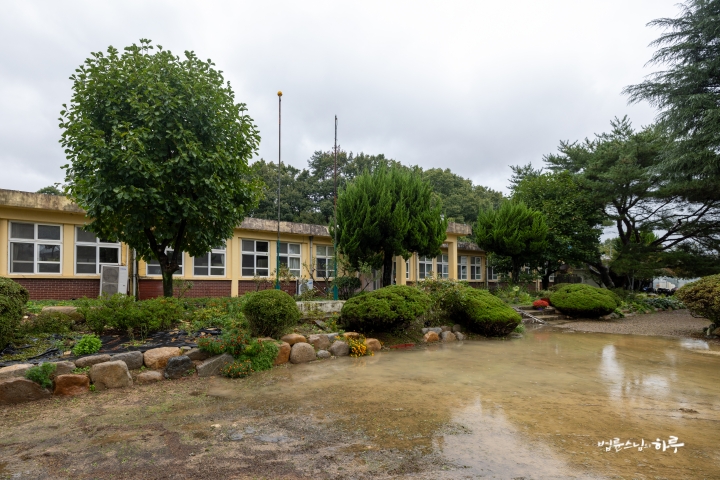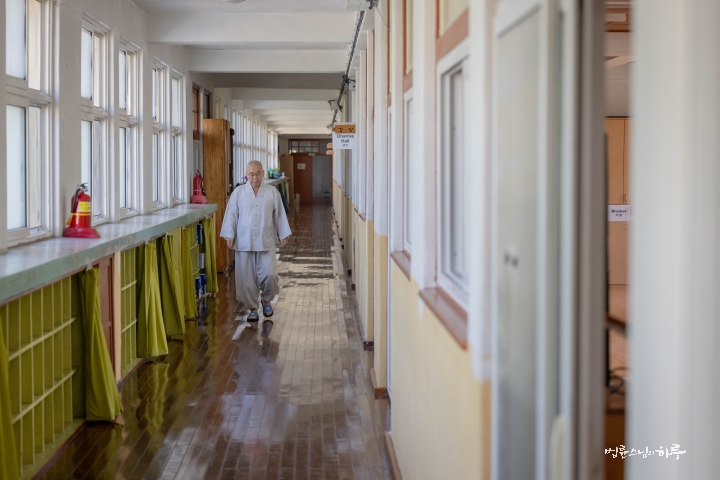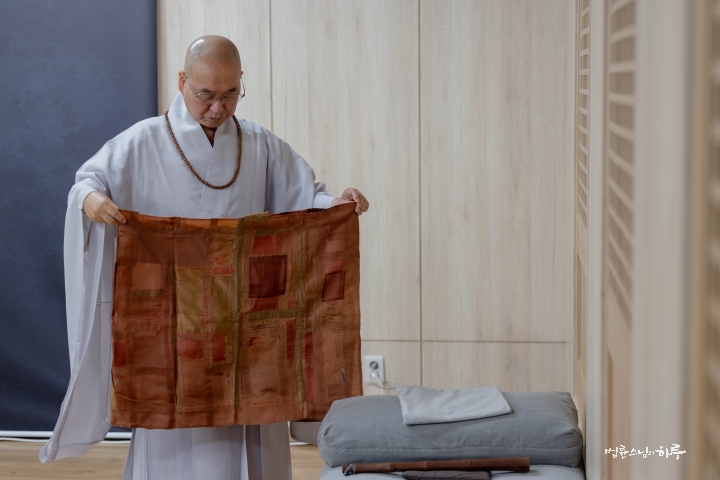Oct 22, 2024 – Buddhist Guests Visit Dubuk Retreat Center, Day 2
Good morning. A new day has dawned at the Dubuk Retreat Center.

After completing his early morning practice and meditation, Sunim continued his conversation with the Buddhist monks who had visited the Dubuk Retreat Center the previous day.

The plan was to visit the Cheonjeonni and Bangudae Petroglyphs if the morning rain subsided. However, due to heavy rainfall, the group continued their discussions indoors, concluding the meeting after lunch.


After the guests departed, Sunim packed his belongings and left the Dubuk Retreat Center at 2:30 PM, heading towards Seoul.

After a four-hour drive on the highway, he arrived at the Seoul Jungto Center at 6:30 PM. It was still raining in Seoul.
In the evening, Sunim attended to his work indoors and concluded the day.
As there was no Dharma talk today, we’ll end this post by sharing the content of the Dharma Q&A session from the Youth History Tour in Gyeongju on the 19th.
My Life Feels Empty Without a Goal
“How old are you now?”
“I’m 36 years old.”
“Do you have any problems making a living with your salary?”
“No, not at all.”
“Are you married?”
“No, I’m not.”
“You couldn’t get married, or you chose not to?”
“I couldn’t get married.”
“Do you want to get married but can’t?”
“Yes, that’s right.”
“So, to put it bluntly, you have high standards.”
“That’s exactly right.” (Laughs)
“It doesn’t make sense for someone who claims to have no specific life goal to have high standards. You must have your own goals, which is why your standards are high.”
“I think marriage is optional. But if I were to get married, I don’t want to be unhappy, so I think my standards keep getting higher. First, I think my partner should be financially stable. Personality is also important, and I’d need to consider whether they might be unfaithful or not.”
“If you’re that picky, you won’t be able to get married. You need to focus on just one aspect – either looks, money, or heart. You should decide, ‘As long as they’re good-looking, I don’t care if they cheat or can’t make money,’ or ‘As long as they have a lot of money, I don’t care if they’re not attractive or have a bad temper,’ or ‘I don’t care if they don’t have money or aren’t good-looking, as long as they only have eyes for me.’ You need to have a clear stance to find a partner easily. It’s not a modest request to want someone who is good-looking, earns a decent amount, has a good personality, and only looks at you. If you input these conditions into a computer and search among the 8 billion people on Earth, what do you think the result would be? It would be zero. Such a person doesn’t exist. It’s extremely difficult to find someone who meets all the conditions you’ve mentioned.

For example, I have one particular preference when it comes to food. I ask that ‘the rice be cooked well.’ I’m not asking for well-prepared side dishes, just for the rice to be cooked properly. So, what constitutes well-cooked rice? When cooking rice, if it’s new rice, you should use a little less water, and if it’s old rice, you should use a bit more water. New rice should be soaked or washed for no more than 30 minutes before cooking. Old rice should be soaked for over an hour before cooking for best results. Once the rice is cooked, you shouldn’t eat it right away. Instead, let it sit for 10 to 20 minutes before opening the lid. When you do this, the rice becomes fluffy, and when you gently stir it with a spoon, it makes a soft rustling sound. When rice is cooked this well, it’s delicious even when eaten plain. You only need kimchi as a side dish. Do you know what people say when I explain this? They say, ‘Sunim, cooking one pot of rice well is more difficult than preparing ten side dishes.’ In my opinion, I’m not picky about food. I’m saying, ‘You can give me any side dishes, just cook the rice well.’ But to others, this seems like a more demanding request than asking for ten side dishes. This is how perspectives can differ.
From your perspective, a marriage partner should have a good personality and shouldn’t cheat. They should earn a decent income, and be good-looking enough that people might say, ‘Your husband is handsome’ when you go out together. He shouldn’t be shorter than you, right? He should be the same height or a bit taller. These conditions aren’t modest. The probability of finding someone who meets all these criteria is zero. In that case, you’d have to live alone. You say you don’t have a goal in life, but this is already an enormous goal. (Laughs)
People often say, ‘I’m not thinking about anything.’ But it’s not that they have no thoughts. They have so many thoughts that they don’t even realize what they’re thinking. Then they mistakenly believe they weren’t thinking at all. If you observe such people carefully, you’ll see they have an enormous number of thoughts. Your current conditions are actually quite good. That’s why you keep setting higher goals. Because your goals are so distant, you feel empty. You should really try to let go of your thoughts for about three years. For the next three years, don’t think about getting married or feeling empty. Just think, ‘It’s enough to wake up in the morning and go to work,’ ‘It’s enough not to get fired and receive a salary,’ ‘It’s enough to eat,’ ‘Everything else is unnecessary,’ ‘If work gets done, fine; if not, that’s fine too.’ Try living leisurely with this mindset. If you do this and pray for 1,000 days, you’ll naturally regain your vitality. It might also be good to take a vacation from work and volunteer with disabled people for about six months, or go to remote places like Bhutan or India and volunteer for a few months. When you return, your self-positivity will be significantly higher.

From a foreign perspective, the living conditions in Korea are enviable. However, Koreans themselves often lack vitality. When meeting Vietnamese youth, their eyes sparkle, they work efficiently, sing well, and are very cheerful. During Sunim’s recent visit to East Timor, despite the challenging living conditions, the young people there were living life with great enthusiasm. Why is this? In such places, even a little effort can improve one’s life. Just completing high school education puts one ahead of others. A little work makes one more skilled than others. Because everyone is poor and undereducated, there’s a higher chance of improving one’s life through individual effort. Even small achievements can lead to success. Sunim met someone who was overjoyed by the sense of accomplishment from digging a small water reservoir in the mountains to create a tiny water supply. They find satisfaction in small things because results are immediate.
In contrast, young people in Korea often feel hopeless. It has become a society where it’s difficult to feel a sense of achievement. You can’t buy a house with your salary, and small protests don’t change the country. In your parents’ generation, even going to jail for protests led to achieving democratization, and efforts resulted in economic development. Now, Korea’s economy has grown so large that there’s little individuals can achieve on their own. This leads young people to think, “What difference can I make?” Additionally, expectations have risen, with people wanting to start married life in an apartment. This has increased the prerequisites compared to the past. However, when you calculate your salary, you realize you can’t even buy an apartment after saving for 30 years without spending. That’s why life feels uninteresting. The only dream left is to get rich quickly through lottery or stocks. Your desire for luck isn’t because you’re bad people, but because life in Korean society feels hopeless. However, objectively speaking, your living conditions are ten times better than people in other countries. It’s just that there aren’t many opportunities for personal achievement right now.
You often compare yourselves to others. Television always shows beautiful people in nice apartments. When you look in the mirror, you feel inferior to the people on TV in terms of looks, housing, education, and skills. This leads to feeling discouraged. You’re not just comparing yourself to one person. You’re comparing yourself to the best-looking, most eloquent, and most talented people out of millions, making it impossible to find anything you’re better at. This leads to feeling stuck and unable to find meaningful work. That’s why Sunim keeps encouraging you to volunteer in poor areas or help people with disabilities. Being there helps you realize how healthy you are and what a great asset it is to be born in Korea.
You need to recognize your own value. It’s not enough for Sunim to tell you a hundred times. Saying “You are inherently Buddha” or “Realize that you are already excellent” won’t sink in. You need to experience it yourself to realize, “Ah, I am a precious being.” This realization brings back vitality. That’s why Sunim thinks it would be better for you to travel to challenging countries rather than places like the U.S. or Europe. People with low self-esteem can gain strength by toughening themselves internally through such remote travel experiences. True understanding comes only through self-realization.
In this regard, the questioner is not feeling empty due to a lack of hope or goals. If we ask a few questions, we can see that the questioner is already doing tremendous planning, wondering “Is this right? Is that right?” You feel hopeless because you think your plans are difficult to achieve.

“Let go of your desires and look at what you have right now. When you lose your job, you realize how precious it was. When you lose your health, you wish you could just be healthy again. When you get old, you understand how wonderful it was to be young. But when you have these things, you don’t appreciate them. You take what you already have for granted and want something else. Take a moment to look at yourself calmly. Once you recognize the value of having a decent job and being healthy right now, you’ll no longer feel empty inside. Instead, you’ll feel a sense of fulfillment.”
“Thank you.”
Tomorrow morning, Sunim will attend a meeting of religious leaders for national reconciliation and peace, followed by a live broadcast of the daytime Weekly Dharma Assembly. In the afternoon, he will participate in a peace research seminar on the topic “Competitive Education is Barbaric.” In the evening, he will conduct a live broadcast of the evening Weekly Dharma Assembly.




